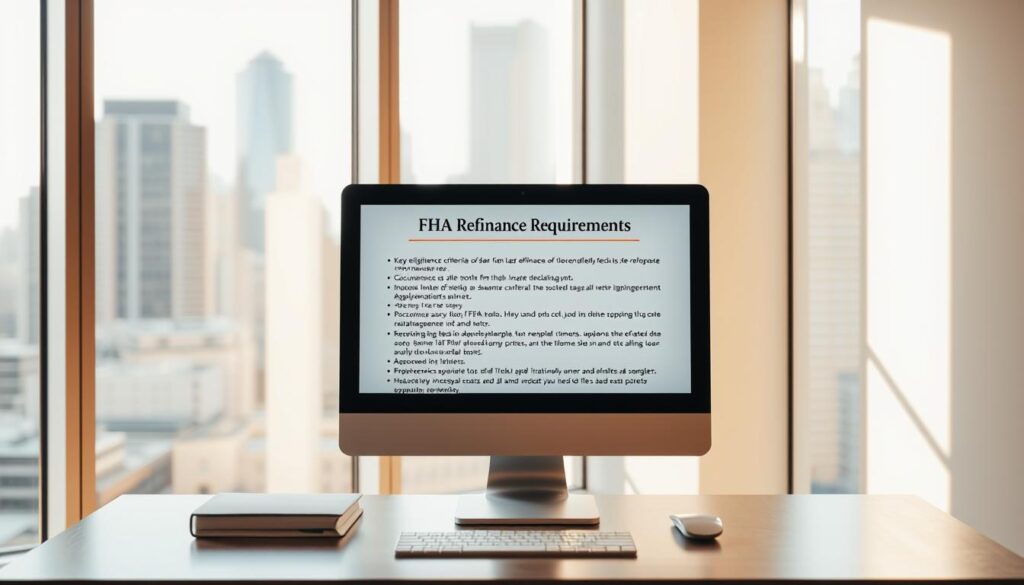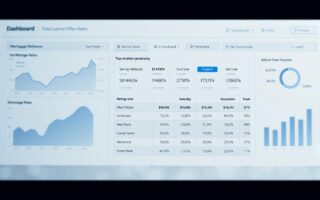“The way to get started is to quit talking and begin doing.” These words by Walt Disney resonate with anyone looking to take control of their financial decisions, such as refinancing an FHA Loan. Refinancing can be a strategic move to lower your interest rate, reduce monthly payments, or tap into your home’s equity.
Refinancing an FHA Loan can seem daunting, but understanding its basics is the first step towards making informed decisions. It’s essential to explore the benefits and requirements to determine if refinancing is the right choice for you.
Key Takeaways
- Understand the benefits of refinancing an FHA Loan.
- Learn about the requirements for FHA Loan Refinance.
- Discover how refinancing can lower your interest rate.
- Explore the possibility of tapping into your home’s equity.
- Determine if refinancing is the right choice for your financial situation.
What Is an FHA Loan Refinance?
Homeowners seeking to leverage their home’s equity or diminish their monthly mortgage outlays may discover an FHA loan refinance as a viable avenue. This refinancing mechanism enables homeowners to transition their existing mortgage into a new loan, insured by the Federal Housing Administration (FHA). Such a transformation is pivotal for achieving financial objectives, whether it involves reducing monthly payments, accessing home equity, or transitioning from an adjustable-rate to a fixed-rate mortgage.
Definition and Basic Principles
An FHA loan refinance constitutes a mortgage refinancing strategy, wherein an existing mortgage is supplanted by a new FHA-insured loan. This refinancing modality is crafted to assist homeowners in realizing their financial aspirations, encompassing the reduction of monthly payments, the extraction of home equity, or the conversion from an adjustable-rate to a fixed-rate loan. The fundamental tenet of FHA refinancing lies in offering homeowners more advantageous loan terms, such as diminished interest rates or reduced mortgage insurance premiums.
How FHA Refinancing Differs from Conventional Refinancing
FHA refinancing diverges from conventional refinancing in several critical aspects. Firstly, FHA loans are insured by the Federal Housing Administration, which affords lenders greater flexibility in credit score requirements and debt-to-income ratios. Furthermore, FHA refinance options frequently exhibit more lenient credit score prerequisites compared to conventional refinancing.
Who Should Consider an FHA Refinance?
Homeowners presently holding an FHA loan may find FHA refinancing particularly appealing, especially if they can secure a lower interest rate or diminish their monthly mortgage insurance premiums. Moreover, individuals aiming to capitalize on their home’s equity or streamline their mortgage payments may also benefit from an FHA refinance. It is imperative for homeowners to meticulously review their fha refinance requirements and explore the array of fha refinance options to ascertain if this refinancing path aligns with their financial goals.
Types of FHA Loan Refinance Options
Homeowners contemplating the refinance of their FHA loans are presented with a spectrum of choices, encompassing streamline, cash-out, and rate-and-term refinancing. Each of these options caters to distinct needs and objectives.
FHA Streamline Refinance
Overview
The FHA Streamline Refinance is a streamlined process designed for homeowners already holding FHA loans. It aims to simplify the refinancing process by minimizing documentation requirements and, in certain scenarios, eliminating the necessity for an appraisal.
Pros
- Less Documentation: The streamlined approach reduces paperwork, thereby accelerating the process and enhancing efficiency.
- No Appraisal Required: In many instances, an appraisal is not obligatory, thereby saving both time and financial resources.
- Lower Costs: This option typically involves lower costs compared to other refinancing alternatives.
Cons
- Limited Eligibility: It is exclusively available to homeowners with existing FHA loans.
- No Cash-Out: Homeowners are precluded from receiving cash from the refinancing process.
Ideal Candidates
Primarily suited for homeowners who are current on their FHA loan payments and seek to either lower their monthly mortgage payments or transition from an adjustable-rate to a fixed-rate loan.
FHA Cash-Out Refinance
Overview
The FHA Cash-Out Refinance enables homeowners to refinance their existing mortgage and extract cash from their home’s equity. This extracted cash can be utilized for various purposes, including home enhancements, debt consolidation, or significant acquisitions.
Pros
- Access to Cash: Homeowners can leverage their home’s equity to access funds.
- Flexible Use of Funds: The extracted cash can be employed for any purpose deemed necessary by the homeowner.
Cons
- Increased Debt: The total mortgage debt increases, potentially impacting creditworthiness.
- Higher Costs: This option may involve higher costs and fees compared to other refinancing alternatives.
Ideal Candidates
Homeowners with substantial equity in their property, requiring cash for critical expenses or debt consolidation, may find this option particularly appealing.
FHA Rate-and-Term Refinance
Overview
This refinance option permits homeowners to modify the interest rate, term, or other conditions of their existing FHA loan without extracting additional cash.
Pros
- Potential for Lower Payments: By adjusting the loan term or interest rate, homeowners can potentially lower their monthly payments.
- Flexibility: Offers the flexibility to tailor the loan terms to better align with the homeowner’s financial circumstances.
Cons
- Closing Costs: Homeowners must bear the costs associated with closing the new loan.
- Potential for Higher Costs Over Time: Extending the loan term may result in increased interest payments over the loan’s lifespan.
Ideal Candidates
Homeowners aiming to adjust their loan terms to secure a more favorable interest rate or to eliminate mortgage insurance premiums may benefit from this option.
FHA Refinance Requirements
To qualify for an FHA refinance, homeowners must adhere to specific criteria established by the Federal Housing Administration. These stipulations are crafted to guarantee that borrowers possess the capability to manage their mortgage obligations and sustain homeownership.
Credit Score Requirements
The FHA mandates a minimum credit score of 580 for refinance loans, albeit lenders may impose more stringent standards. A superior credit score can facilitate access to more advantageous loan terms and reduced interest rates. For example, a credit score exceeding 700 can qualify borrowers for even more favorable refinance options.
Debt-to-Income Ratio Guidelines
The debt-to-income (DTI) ratio is pivotal in determining eligibility for an FHA refinance. The FHA generally permits a DTI ratio of up to 31%, albeit it can be elevated with compensating factors in certain instances. Lenders, however, may impose their own DTI limits.

Property Requirements
The property undergoing refinancing must comply with FHA property standards, encompassing satisfactory condition and a valid appraisal. The type of property, whether a single-family home, condo, or townhouse, can influence eligibility.
Mortgage Insurance Premium Requirements
FHA refinance loans necessitate mortgage insurance premiums (MIPs) to safeguard lenders against default. The upfront MIP can be incorporated into the loan, with the annual MIP disbursed monthly. The expense of MIPs fluctuates based on the loan term and loan-to-value ratio.
Documentation Needed
Homeowners seeking an FHA refinance must furnish a plethora of documents, including income verification, credit reports, and property appraisals. Ensuring the availability of all requisite documentation can expedite the application process.
By comprehending and fulfilling these FHA refinance requirements, homeowners can adeptly navigate the refinance process, thereby achieving their financial objectives.
Benefits of FHA Loan Refinance
Refinancing an FHA loan can revolutionize the financial landscape for homeowners. This process unlocks several advantages, leading to substantial savings and enhanced financial stability.
Lower Interest Rates
One of the primary benefits of FHA loan refinancing is the opportunity to secure lower interest rates. Current fha refinance rates are more favorable than ever, allowing homeowners to save thousands over the loan’s life. By securing a lower rate, homeowners can decrease their monthly mortgage payments, freeing up resources for other financial objectives.
Reduced Monthly Payments
Refinancing an FHA loan can also lead to reduced monthly payments. By either extending the loan term or lowering the interest rate, homeowners can achieve more manageable monthly payments. This facilitates better budgeting and planning for the future.
Access to Home Equity
Homeowners can access their home’s equity through an FHA cash-out refinance. This provides funds for home improvements, debt consolidation, or other financial needs. It is a valuable option for those looking to leverage their home’s value.
Debt Consolidation Opportunities
An FHA refinance offers an opportunity for debt consolidation. By consolidating high-interest debt into a single, lower-interest loan, homeowners can simplify their finances. This reduces their overall debt burden significantly.
Flexible Credit Requirements
FHA refinance loans often feature more flexible credit requirements than conventional refinancing options. This flexibility makes it easier for homeowners with less-than-perfect credit to qualify for a refinance. They can then benefit from the advantages mentioned above.
Current FHA Refinance Rates and Trends
For homeowners contemplating FHA loan refinancing, it is imperative to grasp the prevailing refinance rates and trends. The rates for FHA refinancing are a pivotal determinant in assessing the feasibility of such a move. Currently, rates are experiencing fluctuations, driven by a myriad of economic variables.
Factors Affecting FHA Refinance Rates
Multiple elements dictate FHA refinance rates, encompassing economic indicators, inflation rates, and global market trends. The Federal Reserve’s monetary policies significantly influence these rates. Grasping these factors is crucial for homeowners to make well-informed refinancing decisions.
How to Secure the Best FHA Refinance Rates
To attain the most advantageous FHA refinance rates, homeowners must engage in a comparative analysis of rates from diverse lenders. Enhancing credit scores, diminishing debt-to-income ratios, and selecting the optimal loan term can further facilitate securing superior rates. It is paramount to engage in thorough shopping and negotiation with lenders.
Rate Comparison Tools and Resources
Employing rate comparison tools and resources can streamline the quest for optimal FHA refinance rates. Online platforms and financial websites furnish rate comparison functionalities, while consulting with mortgage brokers can unveil invaluable insights. These tools empower homeowners to make decisions grounded in data.
Market Predictions for Future Rates
Market prognostications indicate that FHA refinance rates will likely oscillate in response to economic dynamics. Experts advocate for vigilance regarding economic forecasts and readiness to capitalize on favorable rate opportunities. Acquaintance with market trends is indispensable for timely decision-making.
By comprehending the current FHA refinance rates and trends, homeowners can more adeptly navigate the refinancing landscape. It is vital to remain abreast of developments and seek counsel from financial specialists to maximize refinancing benefits.
The FHA Refinance Application Process
The FHA refinance application process, while seemingly complex, can be navigated with proper guidance. Success hinges on understanding the involved steps and preparing requisite documentation.
Step-by-Step Application Guide
Initiating the FHA refinance application necessitates identifying the appropriate refinance type. Whether opting for an FHA Streamline Refinance, Cash-Out Refinance, or Rate-and-Term Refinance, comprehension of each’s specific requirements is paramount.
- Choose the right refinance option for your needs
- Gather required financial documents
- Submit your application to a lender
- Lock in your interest rate
- Complete the underwriting process
Required Documentation
To initiate an FHA refinance application, a plethora of financial documents must be compiled, including:
- Pay stubs and W-2 forms
- Bank statements and investment accounts
- Identification documents
- Proof of insurance

Timeline Expectations
The FHA refinance application process generally spans 30 to 45 days. However, this timeframe can fluctuate based on application complexity and lender efficiency.
Common Application Mistakes to Avoid
One prevalent error is the omission of complete documentation. Ensuring all necessary paperwork is prepared can expedite the process. Additionally, being cognizant of your credit score and debt-to-income ratio can circumvent potential obstacles.
“The key to a successful FHA refinance application is preparation and attention to detail.”
Working with Loan Officers
Collaboration with an experienced loan officer can significantly enhance your FHA refinance experience. They can steer you through the application, prevent common pitfalls, and secure optimal terms.
By adhering to these guidelines and being adequately prepared, you can confidently navigate the FHA refinance application process. Remember, the ultimate goal is to streamline the process for maximum benefit.
FHA Refinance Costs and Fees
Engaging in an FHA refinance necessitates a comprehensive understanding of the associated costs. This financial maneuver offers numerous advantages, yet the fees involved are paramount to a well-informed decision-making process.
Upfront Mortgage Insurance Premium
The Upfront Mortgage Insurance Premium (UFMIP) is a significant expense in FHA refinancing. This premium, amounting to 1.75% of the loan’s value, is often incorporated into the loan itself. It serves as a critical component of FHA loan insurance, safeguarding lenders against potential borrower default.
Annual Mortgage Insurance Premium
Beyond the UFMIP, borrowers must also pay an Annual Mortgage Insurance Premium (MIP). This premium, a percentage of the loan’s value, is paid monthly. Its rate is contingent upon the loan term, amount, and loan-to-value ratio.
Closing Costs
Closing costs represent another substantial expense in FHA refinancing. These costs encompass origination fees, appraisal fees, title insurance, and other miscellaneous expenses. It is imperative to consider these costs, as they can escalate rapidly.
Below is a detailed outline of typical closing costs encountered in FHA refinancing:
| Cost Type | Average Cost | Description |
|---|---|---|
| Origination Fee | 0.5% – 1% of loan amount | Fee charged by lender for processing the loan |
| Appraisal Fee | $300 – $500 | Fee for assessing the value of the property |
| Title Insurance | $1,000 – $2,000 | Insurance protecting against title disputes |
Using the FHA Refinance Calculator
An FHA refinance calculator can simplify the comprehension of potential costs. This tool enables users to input loan specifics, thereby obtaining an estimate of monthly payments, closing costs, and other expenses.
Break-Even Analysis
Conducting a break-even analysis is essential to ascertain the timeframe required for the savings from the new loan to compensate for the refinancing costs. This analysis is pivotal in determining the financial viability of refinancing in the long term.
By grasping the costs and fees inherent in FHA refinancing, one can make a more informed decision regarding its financial prudence.
Comparing FHA Refinance to Other Refinancing Options
Homeowners are presented with a myriad of refinancing avenues, encompassing FHA, conventional, VA, and USDA loan refinances, each boasting distinct advantages. Grasping the nuances between these alternatives is paramount for a well-informed decision-making process.
FHA vs. Conventional Refinance
The FHA refinance, backed by the Federal Housing Administration, extends its reach to borrowers with lower credit scores, thereby enhancing accessibility. Conversely, conventional refinances demand a superior credit standing and a diminished debt-to-income ratio. Conventional refinance often proffers superior interest rates to those with impeccable credit.
FHA vs. VA Loan Refinance
VA loan refinances are reserved for veterans, active-duty military personnel, and specific surviving spouses, offering them advantageous terms such as reduced interest rates and the absence of down payments. In contrast, FHA refinances, though not exclusive to veterans, impose stricter mortgage insurance stipulations.
FHA vs. USDA Loan Refinance
USDA loan refinances cater to borrowers with primary residences situated in rural locales, whereas FHA refinances are unrestricted by geography. Both alternatives present unique eligibility criteria and benefits.
When to Choose Each Option
The selection between FHA refinance and other refinancing options hinges on individual circumstances. Opt for FHA refinance when confronted with lower credit scores or the need for more flexible credit standards. Conversely, conventional refinance is advisable for those boasting superior credit scores and seeking potentially advantageous interest rates. Veterans should consider VA loan refinance for its favorable terms. For those residing in rural areas, USDA loan refinance emerges as a viable option.
Conclusion
Refinancing an FHA loan emerges as a pivotal strategy for homeowners aiming to diminish their monthly outlays, leverage their home’s equity, or transition from an adjustable-rate to a fixed-rate mortgage. This discourse has delved into the nuances of FHA loan refinance, encompassing its advantages, prerequisites, and the array of available choices.
Grasping the diverse FHA refinance loan types, such as the FHA Streamline Refinance and FHA Cash-Out Refinance, empowers homeowners to make well-informed mortgage decisions. Whether the objective is to lower interest rates, consolidate debt, or access funds for home enhancements, FHA loan refinance presents a versatile solution.
The process necessitates adherence to specific credit score benchmarks, debt-to-income ratio stipulations, and property standards. Collaborating with a proficient loan officer is crucial to navigate these criteria and facilitate a seamless application journey.
In summary, FHA loan refinancing can yield substantial financial advantages. By selecting the appropriate FHA loan refinance option, homeowners across the United States can attain their financial objectives and experience enhanced financial security.



